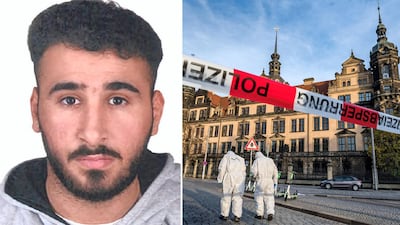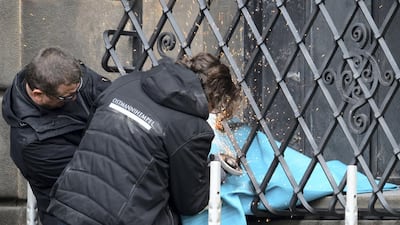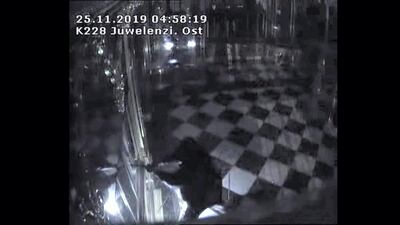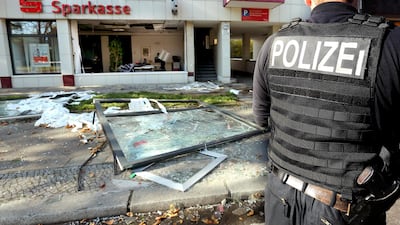A suspected Arab gangster wanted over his alleged role in a €1 billion jewel heist at Dresden's famous Green Vault museum is believed to be hiding out in Germany under the protection of Berlin's notorious Remmo crime gang, The National has learnt.
Abdul Majed Remmo has been on the run for four months after police arrested his twin brother and three other members of the extended clan that is believed to be behind some of the most spectacular criminal raids of modern times in Germany.
Social media connections identified by The National reveal that clan members maintain close ties with supporters in Turkey and Lebanon, where the clan was originally based before fleeing war for Germany in the 1970s.
But detectives believe that Abdul Majed Remmo remains in Germany and is likely to be shielded by the tight-knit community.
Officials are yet to recover any of the items from the November 2019 raid. These include priceless diamonds, brooches, rubies, emeralds, sapphires and a jewel-encrusted sabre.
“Mr Remmo is still missing and we look forward to finding him,” said a spokesman for the Dresden public prosecutors’ office. “We haven’t found any indications about his whereabouts. We think he hasn’t left Germany so far, but we don’t know exactly.”
The Remmo clan, one of the best-known criminal families in Germany, has a history of spectacular heists that hit the headlines and drew the attention of the authorities. In 2017, prosecutors linked the gang to about 1,000 crimes.
The clan has up to 1,000 members, drawn from 13 families, that are spread around Germany. They are from a Mhallami group, part of the Arab minority in Turkey, who moved to Lebanon and then Germany during the civil war.
German media reports suggest the Remmos first came to prominence after being linked to the murder of a restaurateur in 1992, but have since been connected to brazen crimes that have embarrassed officials at some of the country’s best-known institutions.
In 2014, a group raided a Sparkasse bank branch in the Berlin district of Mariendorf, opened dozens of security deposit boxes and escaped with jewellery and cash. To cover their tracks, the raiders blew up the bank on the ground floor of an apartment block.
A member of the Remmo clan, Toufic, was identified from blood at the scene after injuring himself while making his escape. He was jailed the following year for the heist that was estimated to have netted the team of three nearly €10 million ($11.7m).

None of the takings have been recovered and the money is believed to have been ploughed into property in Germany.
Abdul Majed, known by the authorities as a skilled burglar with a string of convictions to his name, was investigated over the daring theft of a 100-kilogram Canadian gold coin, called the Big Maple Leaf, from Berlin’s Bode Museum in 2017.
The coin, with an estimated value of €3.7m, was wheeled through the museum, tossed out of the window and then taken by wheelbarrow to a waiting getaway car. The authorities believe it was cut into smaller pieces and sold.
Abdul Majed spent six months in custody, but there was not enough evidence to prosecute him successfully, according to media reports.
Another member of the clan, Wissam, was arrested but was freed on bail to launch the raid on the Green Vaults in Dresden, prosecutors believe.
The gang broke through a window and smashed a display case with an axe to snatch the jewels at the Green Vaults. They then used at least two high-performance cars to escape, one reportedly disguised as a taxi.
Following the heist, Wissam, a second member of the clan and a security guard were all jailed for their roles in the earlier Bode museum theft.
While serving time, he was arrested for his alleged role in the Dresden burglary, along with two others.
Abdul Majed remains the only known suspect on the run after his twin brother Mohamed, 21, was arrested in December last year in Neukolln, Berlin.

The authorities have launched an effort to tackle the Remmo family, many of whom flaunt their wealth on social media.
“Some run their businesses in their dark, others brag about stolen luxuries on Instagram,” said Tom Schreiber, a politician for Germany's Social Democratic Party, who drew up a 40-point plan to tackle clan crime.
“Asset recovery and the fight against corruption are actively implemented – clan crime is finally an issue on the desks of the executive and the legislature, he said.
The assault on the bank triggered a follow-the-money investigation that resulted in dozens of properties linked to the Remmos being confiscated by the state.
Prosecutors suspect that a relative of Wissam bought the properties using the proceeds from the Mariendorf bank raid.
Properties repossessed by the state included a substantial Berlin villa in the prosperous district of Alt-Buckow, where the head of the clan, Issa Remmo, lived with his family.
Issa Remmo denied wrongdoing and said that his wealth was based on construction and restaurants.

The seizures in 2018 followed a new law designed to help the authorities target gangs' criminal assets.
“The authorities have improved their technical and procedural tools and this is a major improvement,” said Prof Mathias Rohe, whose 2015 report for the state of Berlin into systems of parallel justice led to changes in tackling the clans.
“It is much easier now to get access to their revenue from criminal offences. We have cases of the Remmo family where 77 items of real estate were taken by the state. This is really helpful if it works.”
The Remmos have hit back publicly, with a well-known scion of the clan comparing police treatment of Germany’s Arab clans to the persecution of Jews during the Holocaust.
In a social media post, the clan member said: “Those who persecute us today are the descendants of those who persecuted and destroyed our Jewish fellow citizens.”
A second post, featuring an image of the gates of Auschwitz concentration camp, read: “It didn’t start with gas chambers. It started with hate and intolerance. It started with the deprivation of fundamental rights.”
That view was defended in dozens of posts and comments on Facebook and Instagram, seen by The National, from the accounts of Remmo clan members and their supporters.

Sympathetic users from around Germany rallied around the clan, with one associate from Essen saying the German authorities “haven’t learned anything from the past”.
Clan members and supporters from further afield also engaged with the posts on Instagram and Facebook, revealing a wider network of accounts in Turkey and Lebanon helping to prop up and spread the Holocaust comparisons.
One user, whose profile indicated he was in Turkey, criticised German politician and prominent clan-critic Falko Liecke, who suggested the Remmo villa could be turned into a community centre. He described him as an “only child”, in comparison to the family-first ethos of the Remmo clan.
Neukolln's district mayor Martin Hinkel, who is at the forefront of tackling organised crime in Berlin, told the German daily newspaper Der Tagesspiegel that anyone "who associates an elected city council with Auschwitz is rejecting democratic discourse and marginalising themselves".
He said the clans “use family structures as a protective shield to continue to pursue serious criminal activity”.








